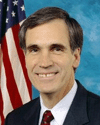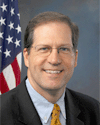| Mar. 17 | |
|
|
|
| DEMOCRATIC PRIMARIES AND CAUCUSES 2008 | Click for Republican primaries and caucuses |
|
News from the Votemaster
Now that the dust has (almost) settled in Ohio and Texas, what actually happened? According to CNN Hillary Clinton won the Ohio popular vote 54% to 44%, but made a net gain of only nine delegates (74 to 65) there. In Texas Clinton won the primary vote 51% to 47% but picked up only a net of four delegates. She lost the Texas caucuses and Obama is projected to pick up a net of nine delegates there. Thus the semifinal results of Clinton's victories in Ohio and Texas is that she gets four delegates more than Obama. Throw in Rhode Island and Vermont, and her net haul on March 4 looks like about six delegates.
The significance of this results is that now everyone is looking to the Pennsylvania primary on April 22 for clarity, but very likely it will be like Ohio. A significant win in the popular vote for Clinton but only a handful of delegates due to the proportionality rules the Democrats use. More about the PA rules in a future posting. The hard reality is that Pennsylvania is not not going to dent Obama's 120 or so delegate lead (see below) much. So it looks like neither candidate is going win a clear majority of the pledged delegates, even if Michigan and Florida vote again. Is there any way out for the Democrats other than a bloodbath?
There might be. Over at MyDD there is a discussion of a possible compromise that could be brokered by Harry Reid, Howard Dean, Al Gore, and Nancy Pelosi. Basically, Reid would give up his position as Senate majority leader and support Hillary Clinton for that position in return for her dropping out of the race. In an Obama administration, she would then be the second most powerful person in the country (the Senate has more power than the House since it gets to vote on thousands on confirmations, including all federal judges). Even in a McCain administration she would have immense power since McCain would almost assuredly face a Senate with something like 55 or so Democrats and he won't be able to get anything done without having the majority leader on board.
The reverse situation--Obama as majority leader--seems less likely. Clinton is actually a popular senator and understands the nuts and bolts of how the Senate works. She could be a leader in the style of Lyndon Johnson, someone who was a master at applying just enough pressure at the right places to make things happen. Obama might be Presidential material (where inspiring people is important) but he is not Senate majority leader material (I'll give you two bridges, a tunnel, and a small national park for your vote on children's health insurance). Of course, Clinton is not likely to go for such a deal until she is convinced that she can't assemble 2025 delegates. But by the end of June, it could happen.
All of a sudden white men are important. Especially working-class white men. Call it the revenge or Archie Bunker or what have you, but they may be the swing vote in the Democratic primaries. Will they vote their race or their gender? Older white women have chosen for gender. Black women of all ages have gone for race. Now it is time for white men to step up to the plate. This is such a strange election, where it appears that demography is destiny, but so be it for the moment. The Washington Post has a story on the suddenly important white men.
Rush Limbaugh has been encouraging Republicans to register as Democrats (temporarily) to vote for Hillary Clinton in order to prolong the Democrats agony and possibly give him a dart board for the next 8 months. However, a false switching parties with your fingers crossed may actually be illegal in Ohio and perhaps some other states. The hard part is proving it, however.
While most people are focusing in the Presidential race, there are also 35 Senate races and 435 House races in November. Let's take a look at some of the top-tier Senate races below. For the scoop on all of them, click on the "All Senate races" link below the map above.
Alaska
| Incumbent | Challenger | Notes |

Ted Stevens (R) |

Mark Begich (D) |
If you Google "The bridge to nowhere" you will find over 50,000 hits, all of them describing Ted Stevens' pet project of spending $320 million of the taxpayers money to build a bridge from Revillagigedo Island (pop. 13,950 including Ketchikan) to its airport, to spare its residents a $5 ferry ride. Outside of Alaska he is the poster boy for pork barrel legislation gone berserk, but within the state he is seen as the guy who is trying to bring home the bacon. Stevens has served longer in the Senate than any Republican ever, which is good, but will be 91 at the end of his next term, which is bad for such a young state. In July 2007, the FBI and IRS raided his home as part of a corruption probe. This event launched a small war between Rep. Chris Van Hollen (D-MD), chairman of the DCCC and Sen. Chuck Schumer (D-NY), chairman of the DSCC. Both of them wanted Anchorage mayor Mark Begich to run for Congress, only Schumer wanted him to challenge the badly weakened Stevens and Van Hollen wanted him to run for the House against Rep. Don Young (R-AK), who is also under investigation for corruption. Schumer won. Begich is running for the Senate. The battle here will be like the national one: change vs. experience. |
Colorado
| Challenger | Challenger | Notes |

Bob Schaffer (R) |

Mark Udall (D) |
When he was first elected in 1996, Sen. Wayne Allard (R-CO) promised to serve only two terms. True to his word, he has announced he will not run for a third term. Colorado has been trending Democratic in recent years. While George Bush carried the state by 6% in 2004, Colorado also elected Ken Salazar (D) to the Senate the same year and just elected Bill Ritter (D) governor by 15%. Furthermore, the Democrats control both houses of the state legislature. Colorado will be the Democrats' number 1 target in 2008. Rep. Mark Udall has announced he is running and unlikely to be challenged in a primary. He has a very strong environmental record in this environmentally conscious state. The most likely Republican is former Rep. Bob Schaffer. Schaffer ran for the Senate in 2004 but lost to Pete Coors in the Republican primary. |
Louisiana
| Incumbent | Challenger | Notes |

Mary Landrieu (D) |

John Kennedy (R) |
Mary Landrieu is one of the two Democrats who barely squeaked by in 2002, having won in a runoff with 52%. The Republicans have her in their crosshairs. They might try to blame hurricane Katrina on her (or more specifically, her response to it), but that would be playing with fire as she would would likely then blame the Republican administration. Her net approval rating is +10%--not great--so this is one of the Republicans best chances for a pickup. Her worst problem is that hundreds of thousands of people, most of them Democrats, left the state after the hurricane. Her likely opponent is state treasurer John Kennedy, who recently switched from the Democratic party to the Republican party to run against Landrieu. Landrieu trivia: Her father, Moon Landrieu, was mayor of New Orleans from 1970 to 1978, and her brother is the current Lt. Governor of Louisiana. |
Maine
| Incumbent | Challenger | Notes |

Susan Collins (R) |

Tom Allen (D) |
Sen. Susan Collins (R-ME) represents a dying breed: moderate Republicans from the Northeast. New England used to be run by them, but they have suffered major losses in recent years. Collins is personally popular, but so was Sen. Lincoln Chafee (R-RI), and it didn't save him. Also working against Collins is her 1996 pledge to serve only two terms, something she repeated in 2002. She recently decided to break that promise and run for a third term. Her opponent, Rep. Tom Allen from ME-01 (who already represents half the state in the House), will undoubtedly harp on the broken promise. This seat will be very competitive. |
Minnesota
| Incumbent | Challenger | Notes |

Norm Coleman (R) |

Al Franken (D) |
Sen. Norm Coleman (R-MN) will be the Democrats number two target in the Senate in 2008. He won his seat in 2002 by a tiny margin after his Democratic opponent, Paul Wellstone, was killed in a plane crash two weeks before the election. The Democrats hastily got former Vice President Walter Mondale to take Wellstone's slot on the ticket, but Mondale was unable to do what Frank Lautenberg pulled off in New Jersey--suddenly jump in and win. Both parties are keenly aware that in Nov. 2006, Hennepin County Attorney Amy Klobuchar (D) crushed Rep. Mark Kennedy (R) by over 20% for an open Senate seat. Comedian Al Franken will almost assuredly be the Democratic nominee. Remember, this is a state that elected a pro wrestler as governor. |
New Hampshire
| Incumbent | Challenger | Notes |

John Sununu (R) |

Jeanne Shaheen (D) |
Sen. John Sununu (R-NH) had not really been on the radar until Nov. 7, 2006, when a political tsunami hit New Hampshire. Gov. John Lynch (D) was reelected with the largest margin in state gubernatorial history at the same time two unknown Democrats knocked off the state's two Republican House members. The Democrats also swept to power in both houses of the state legislature for the first time since 1874. In this environment, the rematch between three-time governor Jeanne Shaheen (D) and Sununu is likely to be very different than Sununu's 2002 4% victory over Shaheen. Early polling gives Shaheen a 15-20% lead. Sununu has the additional burder of being a strong supporter of the war in Iraq, a highly unpopular position in New Hampshire. At this point, the seat leans Democratic. Sununu trivia: Sununu is the youngest member of the Senate and his father was governor of New Hampshire and Bush 41's chief of staff. |
New Mexico
| Challenger | Challenger | Notes |

(R) |

Tom Udall (D) |
New Mexico is truly a swing state. In presidential races, it is split right down the middle. It also has one Democratic senator (Jeff Bingaman) who wins in landslides and one Republican senator (Pete Domenici) who wins in landslides. Under normal conditions, Domenici would be a shoo-in for a seventh term, but in Oct. he announced his retirement due to brain disease. Two Republican members of the House, Heather Wilson and Steve Pearce, want the nomination, so there will be a bruising primary. On the Democratic side, Rep. Tom Udall (cousin of Mark in Colorado) is the likely candidate. This means that all three of New Mexico's congressional seats will be open. However, only NM-01 (Wilson's seat) is in a swing district. Pearce's district is R+6 and Udall's is D+6. |
Oregon
| Incumbent | Challenger | Notes |

Gordon Smith (R) |

(D) |
Sen. Gordon Smith (R-OR) is a moderate senator in a state that is trending Democratic. Although he won by 16% in 2002, his net approval rating is only 11%. While he has a fair shot at being reelected, his likely opponent, state House speaker, Jeff Merkley (D), could run the same campaign against him that Sen. Sheldon Whitehouse (D-RI) ran against former senator Lincoln Chafee (R) in Rhode Island: "Smith is a nice guy but do you want Mitch McConnell to be majority leader?" Merkley has a primary opponent, Steve Novick, but Merkeley is a well-known politician and Novick has never run for public office before, so the odds favor Merkley in the primary. This seat is definitely a Democratic priority. |
South Dakota
| Incumbent | Challenger | Notes |

Tim Johnson (D) |

(R) |
Tim Johnson is one of the two most endangered Democratic senators. He got just 50% of the vote in 2002 against John Thune, who ran again in 2004 and beat Tom Daschle. Furthermore, South Dakota is a heavily Republican state. Despite his narrow win in 2002, Johnson has a +46% net approval rating, so the people of South Dakota like the way he is doing his job. Unfortunately, Johnson suffered a cerebral hemorrhage Dec. 13, 2006. He was operated on immediately and is now recovering. All signs show that he intends to run for reelection in 2008. While he is in no condition to campaign now, a group of his (Democratic) friends in the Senate have begun holding fundraisers for him, so when he is ready to hit the campaign trail, he will have plenty of money. All this puts potential Republican candidates in a bind. Actively campaigning against a very popular senator who had a stroke makes them look mean. If Gov. Mike Rounds runs, it will be a real horse race; if Rounds declines, the most likely opponent is state representative Joel Dykstra, but assuming Johnson has recovered reasonably well, he'll be reelected. |
Virginia
| Challenger | Challenger | Notes |

Jim Gilmore (R) |

Mark Warner (D) |
Sen. John Warner (R-VA) has decided to retire after his term is over in Jan. 2009. Former governor Mark Warner (D) is the Democratic nominee. Warner is young, attractive, and made about $200 million as a cell phone entrepreneur, so he can finance the campaign himself. The only announced Republican so far is former governor Jim Gilmore. troublesome for the GOP is that the Northern Virginia suburbs, which are heavily Democratic, are growing rapidly and led to the election of Jim Webb (D) as senator in 2006 and Tim Kaine (D) as governor in 2005. Warner's retirement has suddenly made Virginia a likely Democratic pickup in the Senate. Even though the last Democratic presidential candidate to carry Virginia was Lyndon Johnson, due to the changing demographics, in 2008 it will be a huge battleground. |
No new polls today.
The polling results for all states are available as a Web page and in .csv format.
Here are the delegate totals from various news sources rounded to integers (Democrats Abroad has 22 delegates, each with 1/2 vote). The sources differ because in most caucus states, no delegates to the national conventions have been chosen yet, just delegates to the district, county, or state convention. Also, all sources try to count the PLEOs (Party Leaders and Elected Officials) and unpledged delegates, who also get to vote at the convention. When different reporters call a PLEO and hear "Well, I like Hillary, but Barack has his charms too" they may score it differently.
Delegates
| Source | Clinton | Obama | BHO-HRC | Edwards | McCain | Romney | Huckabee | Paul |
| Washington Post | 1498 | 1617 | +119 | 1334 | 278 | |||
| NY Times | 1446 | 1569 | +123 | 12 | 1152 | 142 | 225 | 5 |
| AP | 1497 | 1603 | +106 | 26 | 1334 | 257 | 278 | 14 |
| CNN | 1479 | 1618 | +131 | 26 | 1325 | 255 | 267 | 16 |
| ABC | 1485 | 1614 | +129 | 32 | 1267 | 273 | 272 | 14 |
| CBS | 1476 | 1611 | +135 | 26 | 1241 | 149 | 231 | 10 |
| MSNBC | 1251 | 1400 | +149 | 26 | 1266 | 293 | 262 | 14 |
Needed to win: Democrats 2025, Republicans 1191.
Here is another source for delegate totals.
-- The Votemaster